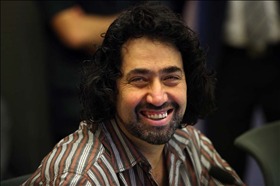For a mess of government pottage
‘Israeli governments are selling our children’s future’
In an interview with the magazine TimeOut Jerusalem, the vice president of Hiddush says the organization works to create equality in education and in shouldering the civic burden, and to expose injustices that hurt society as a whole
14/04/2011 11:26
Tags: Shahar Ilan · Hiddush

Shahar Ilan 2009 Photo: Tom Chaplin
“Israel’s governments are selling our children’s future and haredi children’s future for a mess of government pottage,” says Shahar Ilan, vice president of Hiddush, in an interview with the magazine TimeOut Jerusalem. “The state is violating international treaties that bar it from financing sectored education that does not prepare for the job market, and all to preserve the coalition.”
In the interview Ilan says that Hiddush is fighting to change this situation, and to increase equality among all segments of society. “Hiddush arose out of an assumption that the roots of all the religious problems in the country may be traced to the deep malady that includes the mixing of politics and religion,” he says. “Hiddush said that we need a body that will deal with the whole range of religion and state, and won’t do this on behalf of a given sector.”
According to Ilan, it might have been possible to continue permitting the haredim to rely on allowances if the public in question constituted 5% of the general population, but the ultra-Orthodox populace only grew. “The public wants this to stop. We need equality in education, equality in shouldering the civic burden, service by everyone, work by everyone, taxes paid by everyone.”
The general population in Israel feels, Ilan says, that a great injustice has been done to it in the allocation of resources. He emphasizes that the organization works to expose not only inequality in shouldering the civic burden, but also injustices that hurt society as a whole. “Last summer we exposed the reform in exemption [from military service] for haredim and got the government to set up a committee that discussed the issue and to moderate its reform.”
Hiddush fights injustice by, among other means, publishing
Hiddush fights injustice by, among other means, publishing reports on religious coercion
reports on religious coercion. “Not long ago we discovered, for example, that there are more than 60 gender-segregated bus routes running in Israel, which operate more than 2,500 segregated rides a day. So then it is no longer a haredi matter. It is a matter of harassment of women who board these lines and are asked to board dressed in particular attire and are forced to sit in a particular place.”
According to Ilan, the reason for this state of affairs is the activity by zealous circles within haredi society, which create a type of Judaism the likes of which never existed before in history. “There was never a demand that men and women be segregated, there was never a demand to eat only mehadrin, there was never a demand that women cover their faces,” he says. One of the explanations for this change has to do with the state of haredi leadership. He terms the heads of the ultra-Orthodox public “a bunch of Yitzhak Shamirs who just want to freeze the status quo.”
Another consequence of the approach the haredi leadership takes is the haredization of Jerusalem. Ilan elucidates just how little this benefits the city: “The haredim do not understand that a Jerusalem without secular people is bad for haredim. We have to stop the haredization of Kiryat Yovel, we have to build new neighborhoods for secular people, we have to ensure jobs for secular people. Somebody has to decide that he has a national interest in there being secular people left in Jerusalem. We also have to build haredi neighborhoods. If we provide a supply of several thousand haredi apartments, the pressure on Kiryat Yovel will decrease, but there needs to be a combined maneuver here.”